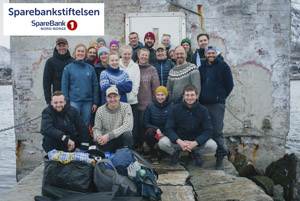The Ten Principles of Citizen Science are more than a source of inspiration for us.
They shape every one of our projects. We have them in mind when a new idea emerges, when we discuss a new collaboration with a researcher, and during the successive stages of a project:
1. Citizen science projects actively involve citizens in scientific endeavor that generates new knowledge or understanding. Citizens may act as contributors, collaborators, or as project leader and have a meaningful role in the project.
2. Citizen science projects have a genuine science outcome. For example, answering a research question or informing conservation action, management decisions or environmental policy.
3. Both the professional scientists and the citizen scientists benefit from taking part. Benefits may include the publication of research outputs, learning opportunities, personal enjoyment, social benefits, satisfaction through contributing to scientific evidence e.g., to address local, national and international issues, and through that, the potential to influence policy.
4. Citizen scientists may, if they wish, participate in multiple stages of the scientific process. This may include developing the research question, designing the method, gathering and analyzing data, and communicating the results.
5. Citizen scientists receive feedback from the project. For example, how their data are being used and what the research, policy or societal outcomes are.
6. Citizen science is considered a research approach like any other, with limitations and biases that should be considered and controlled for. However, unlike traditional research approaches, citizen science provides opportunity for greater public engagement and democratization of science.
7. Citizen science project data and meta-data are made publicly available and where possible, results are published in an open access format. Data sharing may occur during or after the project unless there are security or privacy concerns that prevent this.
8. Citizen scientists are acknowledged in project results and publications.
9. Citizen science programs are evaluated for their scientific output, data quality, participant experience and wider societal or policy impact.
10. The leaders of citizen science projects take into consideration legal and ethical issues surrounding copyright, intellectual property, data sharing agreements, confidentiality, attribution, and the environmental impact of any activities.

Where does this list come from?
As the term citizen science enters the Oxford English Dictionary in 2014, the rapid expansion of citizen science globally presents researchers and citizen science practitioners with a challenge: creating cohesion and identifying a common purpose globally, whilst also supporting and enhancing the further expansion, independence, creativity and bottom-up nature of citizen science
In 2015, the European Citizen Science Association (ECSA) and its working group on “Sharing best practice and building capacity for citizen science” published the Ten Principles of Citizen Science. Drawing from the collective experiences of many ECSA members, this series of statements sets out the key principles of citizen science. This is the foundation of good practice in citizen science regardless of the academic discipline or cultural context in which it is applied. It is currently available in 26 languages.
An integrative working group
The ECSA working group is chaired by the Natural History Museum London and its members come from universities, natural history museums and not-for-profit organizations, representing researchers, citizen science practitioners and networking or co–ordination bodies.
Ten Principles towards excellence
The Ten Principles underpin responsible and impactful citizen science projects, with the aim of supporting those new to citizen science. They help to deliver high-quality projects and providing a benchmark against which to examine existing citizen science programs. The principles were designed to be applicable across a broad spectrum of citizen science activities. They serve the same aim of promoting excellence in science research, environmental protection, public engagement and active involvement in the scientific and policy processes.
Ethics and open access
In a rapidly moving field, best practice, too, will evolve and develop, and in time an 11th or 12th principle may be added to this current suite. In particular, developments in the fields of ethics, technologies and open data will strongly influence views of best practice in coming years.



